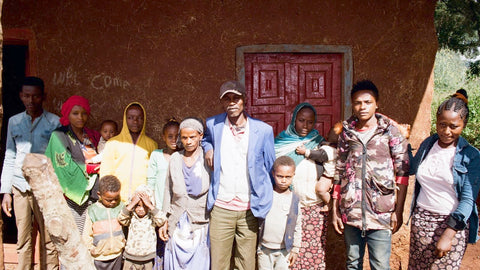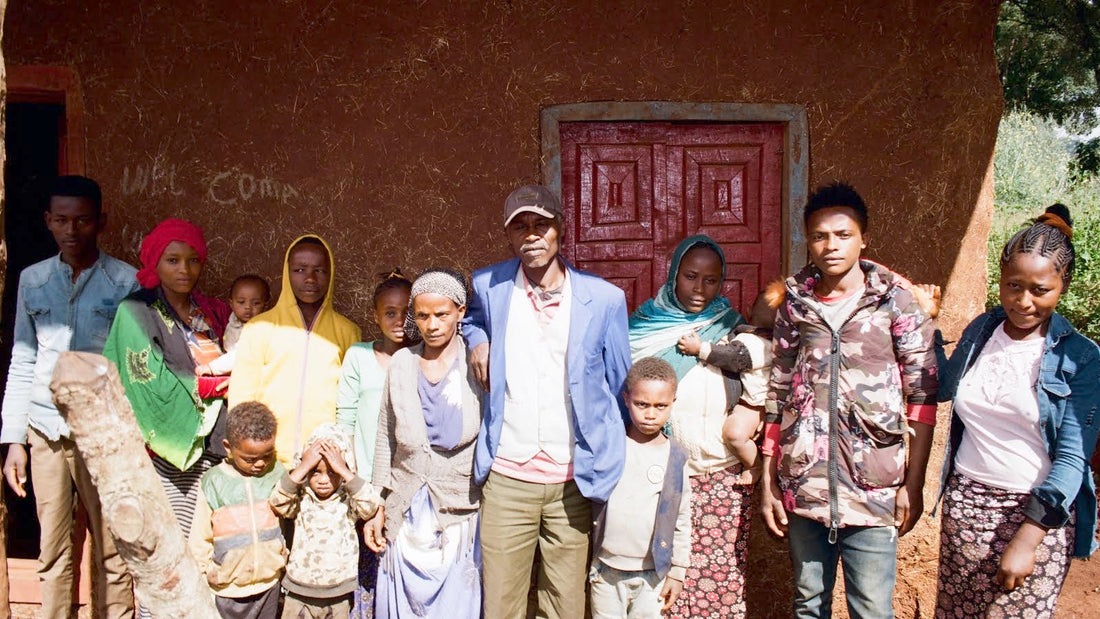
Tamiru and his family outside of their new home
Uraga, Guji Zone, Oromia, Ethiopia
Photo by Michael Grant
I honestly couldn’t believe it. The coffee growers we met in the town of Uraga in Guji had never met any African Americans in Ethiopia. How? And why did it take so long to reconnect defendant’s of the group of Africans stolen to grow coffee, with those who discovered. Of course, we knew we had never been to Africa before, let along to the Guji Zone of Ethiopia. That was the whole point of the trip. To come back home and learn from black folks about this black thing we had fallen in love with. This was a place we tasted through its coffee and had dreamed of visiting since we first felt a connection through its seeds, but when they said we were the first black coffee folks to visit their town, and treated us with the honor of prodigal sons returning home, I couldn’t hold back the tears. This was a family reunion only the YWHW could write, and as black folks in coffee, it’s changed how we view its history and future forever.
Coming to the origin both of human and coffee history left tons of emotions pent up for us as we anticipated arrival. Joy, fear of rejection, gratitude to even get the chance, the list goes on. What we didn’t expect that so many of our brothers and sisters in Ethiopia would feel the same way. The reigniting of the two worlds, and they were even more exited than we could have ever imagined to reconnect in person through the seeds that had been stolen from our collective soil.
When we went to Ethiopia, we didn’t see any poor people. We just saw wealthy folks who hadn’t been properly compensated by the world who profits from their genius. So, this Black Friday, and for the rest of holiday season, we want to change that. For the next week, 1 dollar from each bag of Guji Mane will go to purchase school supplies for the future entrepreneur, agricultural specialists, rappers, and baristas we met on our first trip home.
 Upon arriving in Guji, @turewaji introduced us to Tamiru, the lead farmer behind the lot of coffee our hosts Ture and Mike Mamo were exporting as @greenspring.coffee. We knew that this brother would probably be the brains behind the coffee we would cary as Guji Mane when we got back, but a ton of questions raced through our mind as we got out of the whip at his farm.
Upon arriving in Guji, @turewaji introduced us to Tamiru, the lead farmer behind the lot of coffee our hosts Ture and Mike Mamo were exporting as @greenspring.coffee. We knew that this brother would probably be the brains behind the coffee we would cary as Guji Mane when we got back, but a ton of questions raced through our mind as we got out of the whip at his farm.
“Would he accept us?”
“Were we too Americanized to be embraced as fellow Africans?”
“Could we even purchase enough coffee to make it worth his time and energy in comparison to the white folks who had visited before us?”
It wasn’t until we went into a small hut behind his house, and saw one of his daughters cooking that we realized we had gotten it all wrong, and that everything we had hoped for was more true than we imagined.

On the road to Guji, we had tons of amazing food, but what stood out was the corn. So bright, sweet, and savory at the same time. Little did we know that same corn would be the basis behind our first meal on Tamiru’s land. His daughter, who I mentioned was cooking when we arrived, was making meal that consisted of hand-ground corn mixed with water, wrapped in banana leaves, and cooked under a fire. It was served with chopped leafy greens, and spiced with enough heat to make you appreciate quenching your thirst with the coffee you were served right after. 
Now to some of you that may sound like foreign African delicacy, but to me that sounds, looked, and tasted just like my Granny's hot water cornbread and greens. I couldn’t believe it. We were almost 8000 miles away from my Granny's house in Alabama, but we were eating a meal I’d helped her make countless times. It was spiced just like she used to with the pepper juice she kept on hand at all times, in a home with a tin roof that was build by hand, just like her husband had done so many years before I was born.

We haven’t talked much publicly about our trip back home, because in all honestly, how do you talk about an experience that changed your life? But this is the beginning of us sharing, and we thought it was appropriate to do this on Black Friday, a day that is normally used to further widen the gap between the black faces who produce so many of the goods this hyper-capitalist world is built on, and those who consume them.
This coffee culture, the coffee that was melanated, country, African, and served with a side of hot water cornbread and greens, is not the coffee culture we were shown in America. It is not the culture we experienced in Starbucks or our locally gentrified cafes, and not the culture we experienced at conferences or on coffee centric social media pages. It’s not the culture that made us feel like we were too dark to be knowledgeable, that our tongues were too hood to have distinguished palettes, and opinions too hip hop to differ from the industry’s favorite white man. But this culture, the one we experienced in Africa, as black as it was, had more of a claim to “good coffee” than any of the aforementioned appropriations could ever constitute with a refractometer or award winning recipe.

Tamiru’s face, his daughter face as she made hot water cornbread, his family's faces as they stood proudly in front of their home, and the countless other faces we met in the motherland…These are not the faces we were shown when we were introduced to cxffee. But these are the faces behind coffee’s history. His children are the faces of coffee future. And the real, undeniable, historical fact, is that they are black, like me.

